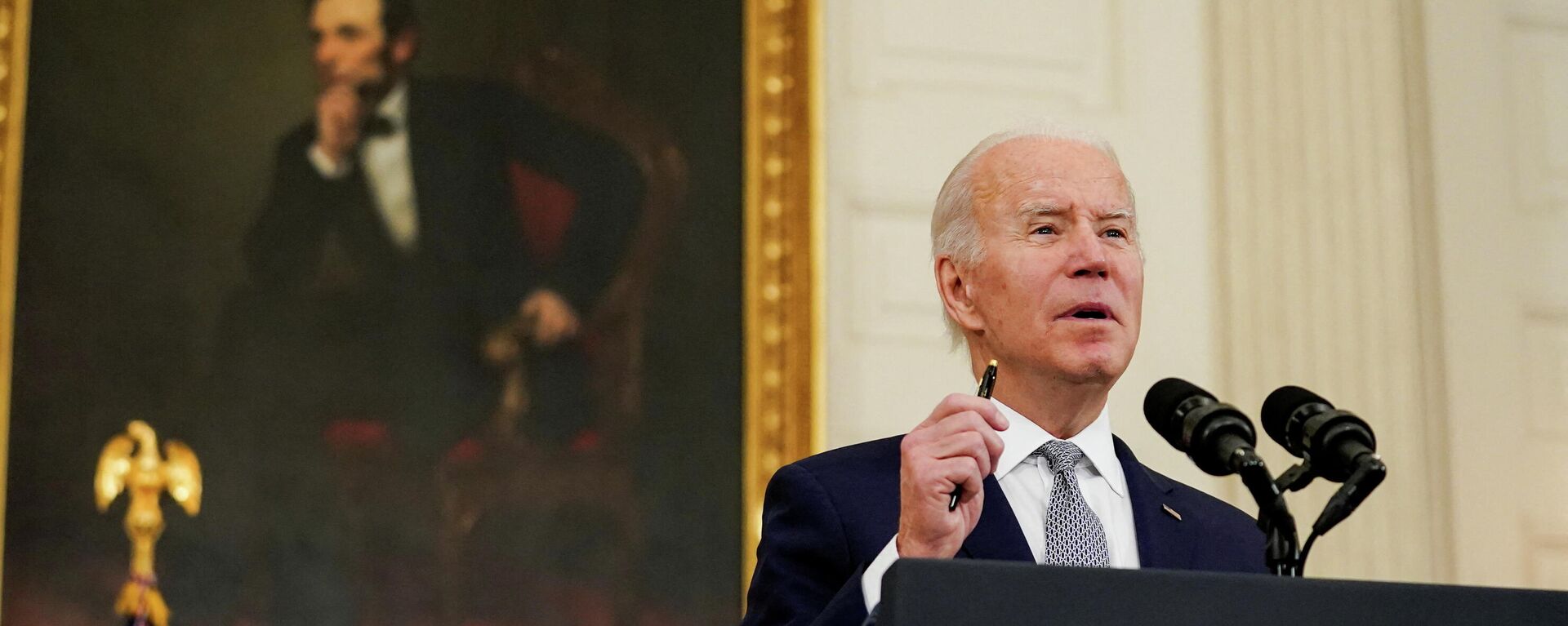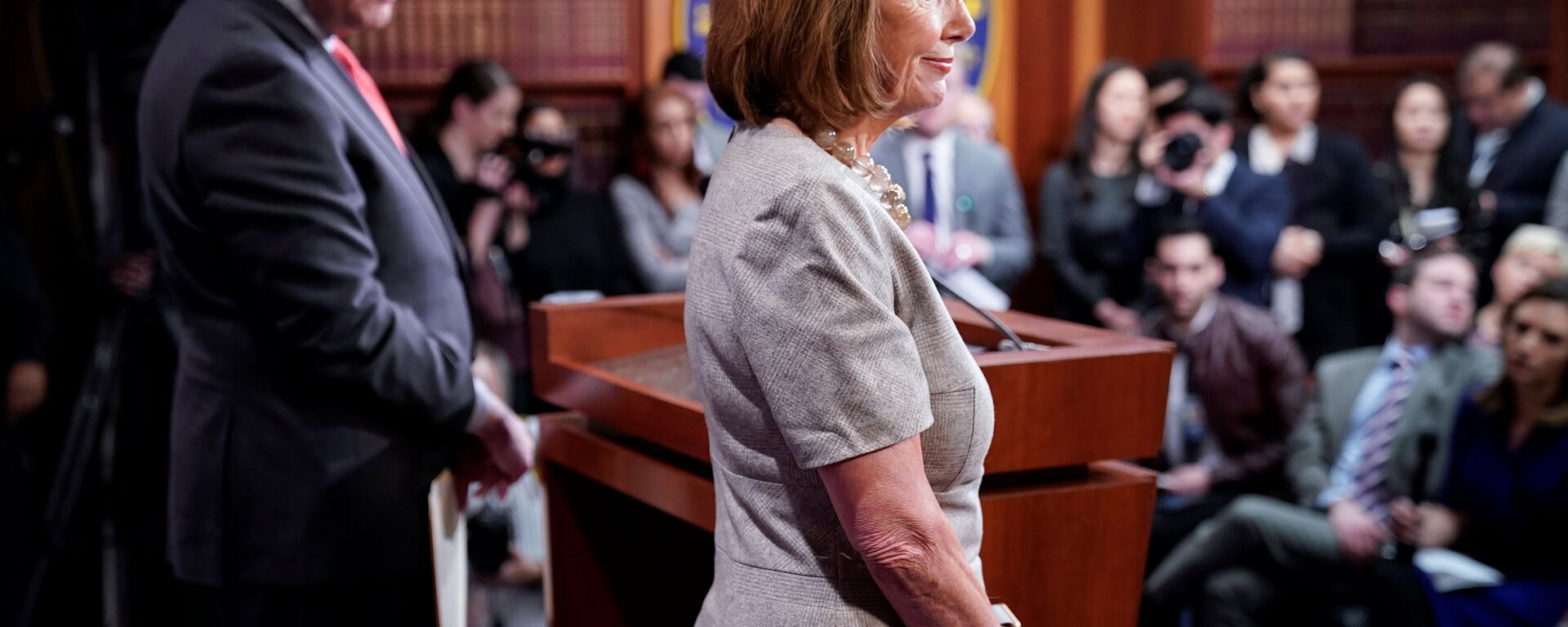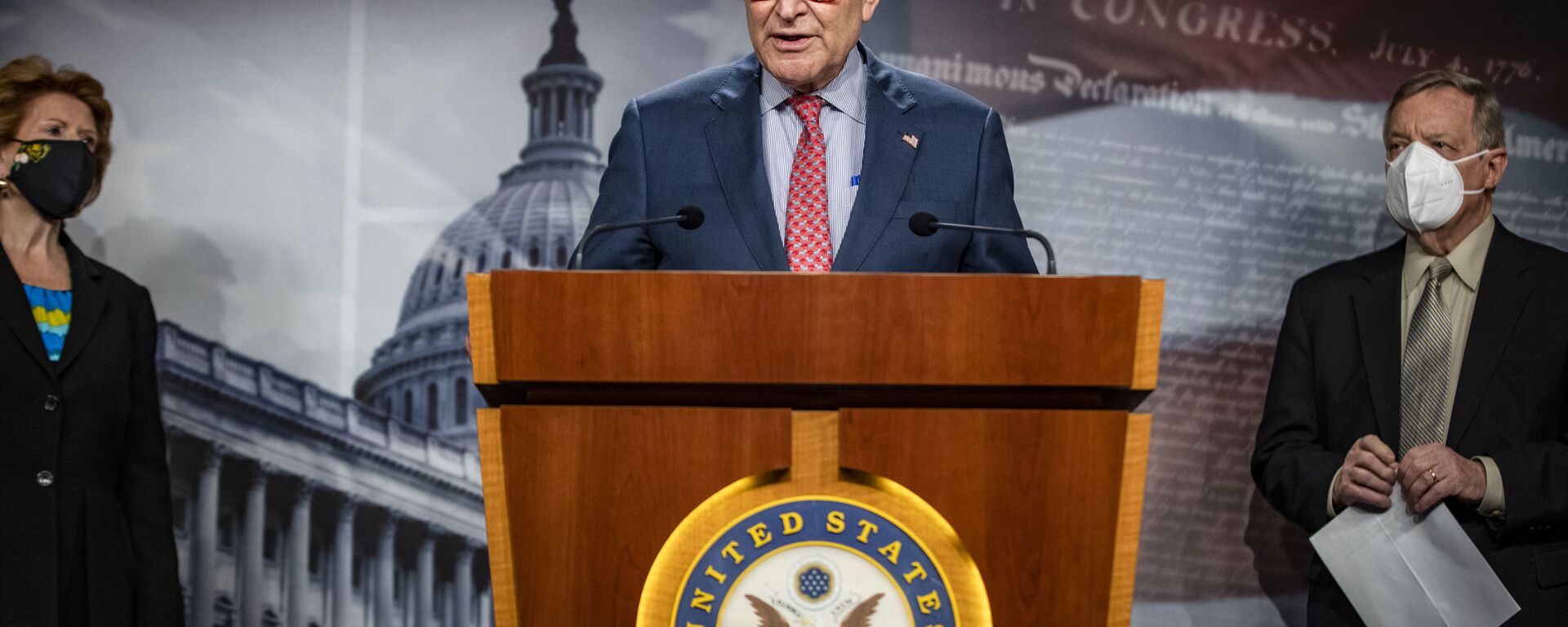https://sputnikglobe.com/20220112/partisan-fight-intensifies-as-voting-rights-bill-in-hot-water-in-us-senate-yetagain-1092209922.html
Partisan Fight Intensifies as Voting Rights Bill in Hot Water in US Senate Yet Again
Partisan Fight Intensifies as Voting Rights Bill in Hot Water in US Senate Yet Again
Sputnik International
The Senate is scheduled to consider the Democratic-backed Freedom to Vote Act on 12 January.
2022-01-12T16:44+0000
2022-01-12T16:44+0000
2022-01-12T16:44+0000
newsfeed
world
us
sen. joe manchin (d-west virginia)
elections
election fraud
voting rights
us election 2020
kyrsten sinema
https://cdn1.img.sputnikglobe.com/img/07e5/01/0d/1081747467_0:161:3071:1888_1920x0_80_0_0_0c9f009ade3312c9c2aae69ae0f761db.jpg
Joe Biden and Kamala Harris on 11 January visited Atlanta in Georgia to promote voting rights legislation and overcome filibuster rules in the US Senate that have blocked the bill from advancing. The Democratic Party has repeatedly failed to pass the For the People Act and its current revamped version, the Freedom to Vote Act, in the evenly split upper chamber.Georgia's Republican Gov. Brian Kemp called the incumbent president "out of touch with reality" for advocating to unleash federal election rules on the state. Kemp insisted that the GOP-backed Georgia voting law helps ensure election integrity by expanding early voting opportunities, securing drop boxes around the clock, reducing long lines at polling places, and implementing voter ID requirements for in-person voting and absentee ballots.In the wake of the controversy surrounding the 2020 race, dozens of GOP-led legislatures introduced a package of laws seeking to bolster voting integrity. A new Morning Consult poll has found that only 22 percent of Republicans believe the 2020 election was "free and fair." According to New York University's Brennan Center for Justice, 19 states passed 33 voting laws bolstering ID rules triggered by suspicions of apparent election fraud and voting irregularities.What's the Dems' Reasoning?According to the Democrats, the latest GOP efforts to tighten election laws are nothing short of a suppression of voting rights of the minorities. The American Civil Liberties Union (ACLU) highlights that 34 states have identification requirements at the polls, while seven states have strict photo ID laws, under which voters must provide a form of government-issued photo ID in order to cast a regular ballot.The civil activists insist that 11 percent of US citizens – or more than 21 million Americans – do not have government-issued photo identification, while some cannot afford getting one. The ACLU cites a 2014 GAO study saying that strict photo ID laws reduce turnout by 2-3 percentage points, which can translate into tens of thousands of votes lost in a single state.Therefore, among other measures, the Freedom to Vote Act would:· require states that mandate voter IDs to accept a broad and uniform range of both photo and non-photo IDs;· require states to allow voters to apply for an absentee ballot online;· require states to allow people to register to vote online;· prohibit states from requiring absentee ballots to be notarised or have witness signatures;· require states to allow people to register to vote on election day;· expand voters’ ability to cast their ballots by mail, establishing basic national standards for all eligible voters.While the future of the Freedom to Vote Act is hanging in the balance in the upper chamber, 25 states have already loosened voting restrictions and ID requirements, including 15 that have made mail-in voting easier.For its part, the John Lewis Voting Rights Accountability Act would reactivate Section 5 of the Voting Rights Act of 1965 which requires certain states or local jurisdictions with a certain number of voting rights violations in the last 25 years to gain permission from the federal government to change their election laws. The civil rights law was upended in two major Supreme Court decisions: the first in 2013 and the second in 2021. In particular, Section 5 was rendered meaningless by SCOTUS in 2013.Why GOP is Opposing the Voting Rights BillsThe Republicans argue that loosening voter identification rules, as well as automatic and same day registration could invite election fraud by allowing ineligible voters to cast ballots in federal races and opening the door to double-voting.The GOP draw attention to the fact that the majority of Americans back strict ID rules. Indeed, a November 2021 Axios-Ipsos poll indicated that 68 percent of Democrats, 92 percent of Republicans and 80 percent of independents said that a photo ID requirement would make them more confident that elections are open and fair.At the same time, US conservatives cite the results of the Arizona audit of the 2020 election results in Maricopa County which found a whole set of election anomalies. They also refer to the Texas 2020 audit in the counties of Collin, Dallas, Harris and Tarrant which exposed roughly 12,000 potential non-citizens suspected of illegally registering to vote.The Republicans see the Freedom to Vote Act and the accompanying John Lewis Voting Rights Accountability Act as a "federal take-over," since the bills would impose standard rules nation-wide thus stripping state legislatures of their prerogative to define the time and manner of voting.The GOP has raised the alarm over Senate Majority Leader Chuck Schumer's threat to proceed with changing the upper chamber rules and weaken the legislative filibuster to ram the two bills through the Senate.The Freedom to Vote Act is scheduled for Senate consideration on 12 January. If it fails, the Democratic Senate Caucus would seek changing the rules. However, the Dems would need each and every vote of their party fellows in the upper chamber to weaken the filibuster. It's unclear whether moderate Democrats Joe Manchin and Kyrsten Sinema will support the partisan move.
https://sputnikglobe.com/20220111/tired-of-being-quiet-biden-urges-senate-to-change-filibuster-rules-to-pass-voting-rights-bills-1092189365.html
https://sputnikglobe.com/20220108/its-now-or-never-whats-behind-dems-push-for-changing-senate-rules--passing-voting-rights-bills-1092109670.html
https://sputnikglobe.com/20220103/federalising-elections-dems-signalled-readiness-to-change-senates-rules-to-pass-voting-rights-bill-1092001129.html
Sputnik International
feedback@sputniknews.com
+74956456601
MIA „Rosiya Segodnya“
2022
News
en_EN
Sputnik International
feedback@sputniknews.com
+74956456601
MIA „Rosiya Segodnya“
Sputnik International
feedback@sputniknews.com
+74956456601
MIA „Rosiya Segodnya“
voting rights, the freedom to vote act, the for the people act, arizona audit, "federal takeover", the john lewis voting rights accountability act, alleged election fraud, election integrity, id laws
voting rights, the freedom to vote act, the for the people act, arizona audit, "federal takeover", the john lewis voting rights accountability act, alleged election fraud, election integrity, id laws
Partisan Fight Intensifies as Voting Rights Bill in Hot Water in US Senate Yet Again
The US Senate is scheduled to consider the Democratic-backed Freedom to Vote Act on 12 January. A day earlier, US President Joe Biden and Vice President Kamala Harris attended a gathering at the Atlanta University Centre in order to spearhead the Democratic initiative.
Joe Biden and Kamala Harris on 11 January visited Atlanta in Georgia to promote voting rights legislation and overcome filibuster rules in the US Senate that have blocked the bill from advancing. The Democratic Party has repeatedly failed to pass the For the People Act and its current revamped version, the Freedom to Vote Act, in the evenly split upper chamber.
Georgia's Republican Gov. Brian Kemp called the incumbent president "out of touch with reality" for advocating to unleash federal election rules on the state. Kemp insisted that the GOP-backed Georgia voting law helps ensure election integrity by expanding early voting opportunities, securing drop boxes around the clock, reducing long lines at polling places, and implementing voter ID requirements for in-person voting and absentee ballots.
In the wake of the controversy surrounding the 2020 race, dozens of GOP-led legislatures introduced a package of laws seeking to bolster voting integrity. A new Morning Consult poll has found that only 22 percent of Republicans believe the 2020 election was "free and fair." According to New York University's Brennan Center for Justice, 19 states passed 33 voting laws bolstering ID rules triggered by suspicions of apparent election fraud and voting irregularities.

11 January 2022, 23:05 GMT
What's the Dems' Reasoning?
According to the Democrats, the latest GOP efforts to tighten election laws are nothing short of a suppression of voting rights of the minorities. The American Civil Liberties Union (ACLU) highlights that 34 states have identification requirements at the polls, while seven states have strict photo ID laws, under which voters must provide a form of government-issued photo ID in order to cast a regular ballot.
The civil activists
insist that 11 percent of US citizens – or more than 21 million Americans – do not have government-issued photo identification, while some cannot afford getting one. The ACLU cites a 2014 GAO study saying that strict photo ID laws reduce turnout by 2-3 percentage points, which can translate into tens of thousands of votes lost in a single state.
Therefore, among other measures, the Freedom to Vote Act
would:
· require states that mandate voter IDs to accept a broad and uniform range of both photo and non-photo IDs;
· require states to allow voters to apply for an absentee ballot online;
· require states to allow people to register to vote online;
· prohibit states from requiring absentee ballots to be notarised or have witness signatures;
· require states to allow people to register to vote on election day;
· expand voters’ ability to cast their ballots by mail, establishing basic national standards for all eligible voters.
While the future of the Freedom to Vote Act is hanging in the balance in the upper chamber, 25 states have already loosened voting restrictions and ID requirements, including 15 that have made mail-in voting easier.
For its part, the John Lewis Voting Rights Accountability Act would reactivate Section 5 of the Voting Rights Act of 1965 which requires certain states or local jurisdictions with a certain number of voting rights violations in the last 25 years to gain permission from the federal government to change their election laws. The civil rights law was upended in two major Supreme Court decisions: the first in 2013 and the second in 2021. In particular, Section 5 was rendered meaningless by SCOTUS in 2013.

8 January 2022, 10:41 GMT
Why GOP is Opposing the Voting Rights Bills
The Republicans argue that loosening voter identification rules, as well as automatic and same day registration could invite election fraud by allowing ineligible voters to cast ballots in federal races and opening the door to double-voting.
The GOP draw attention to the fact that the majority of Americans back strict ID rules. Indeed, a November 2021 Axios-Ipsos poll
indicated that 68 percent of Democrats, 92 percent of Republicans and 80 percent of independents said that a photo ID requirement would make them more confident that elections are open and fair.
At the same time, US conservatives cite the results of
the Arizona audit of the 2020 election results in Maricopa County which found a whole set of election anomalies. They also refer to the Texas 2020 audit in the counties of Collin, Dallas, Harris and Tarrant which exposed
roughly 12,000 potential non-citizens suspected of illegally registering to vote.

3 January 2022, 19:05 GMT
The Republicans see the Freedom to Vote Act and the accompanying John Lewis Voting Rights Accountability Act as a "federal take-over," since the bills would impose standard rules nation-wide thus stripping state legislatures of their prerogative to define the time and manner of voting.
The GOP has raised the alarm over Senate Majority Leader Chuck Schumer's threat to proceed with changing the upper chamber rules and weaken the legislative filibuster to ram the two bills through the Senate.
The Freedom to Vote Act is scheduled for Senate consideration on 12 January. If it fails, the Democratic Senate Caucus would seek changing the rules. However, the Dems would need each and every vote of their party fellows in the upper chamber to weaken the filibuster. It's unclear whether moderate Democrats Joe Manchin and Kyrsten Sinema will support the partisan move.







